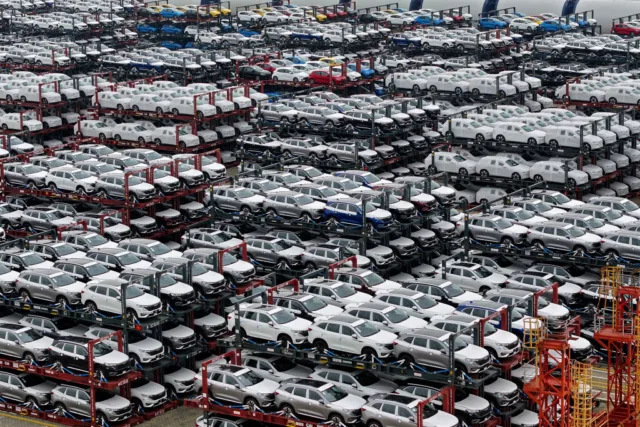
China has built the world’s leading electric vehicle industry with more than 100 brands from the country. Those cars have all sorts of features that would wow the average U.S. driver—and they come at a lower price point than the American or European competition.
But the majority of U.S. consumers don’t want them, according to new polling from the University of Chicago and AP-NORC. Even when the Chinese car is $10,000 cheaper than the U.S. one, a majority of respondents to the poll released Thursday said they would prefer their vehicle was made in the U.S.A.
There are, however, two big caveats: the advantage for U.S. cars generally gets narrower and narrower as the savings increases. Two thirds of Americans say it would be worth $500 more to buy a U.S. car rather than a Chinese one; 53% say it’s worth paying $10,000 more. And then there’s the change over time. Just in the last year, the share of respondents who say they are willing to pay more has shrunk significantly—with a double-digit shift toward the cheaper Chinese vehicle for both a $500 and $5000 savings.
For now, this is of course mostly theoretical. You can’t easily buy a Chinese EV in the U.S. Chinese automakers don’t have U.S. dealerships or distributors. To import one would require a hefty tariff and doing so will soon effectively be banned due to national security restrictions.
But to dismiss the rise of Chinese EVs as irrelevant to the U.S. would be a strategic misstep. I keep thinking way back to my U.S. history coursework. In 1959, Soviet Premier Nikita Khrushchev engaged then-U.S. Vice President Richard Nixon in an impromptu debate in front of a replica of an American kitchen. Nixon pointed to the kitchen and its modern appliances as a sign of the opportunities capitalism can provide. Khrushchev argued that the goods were a sign of modern decadence. Ultimately, the moment encouraged the Soviet population to agitate for household comforts.
Advertisement
How will American consumers feel when they wake up to the reality that the rest of the world is enjoying new luxuries at a low cost? In Washington, many elected leaders on both sides of the aisle believe that tough-on-China is a winner as both a political and policy matter. As the survey shows, American consumers may accept that up to a point, but in the long-term it will be hard to fight a cheaper, better product.
Companies with a view into China see the challenge on the horizon, but proactive moves have been few and far between. For the most part, U.S. manufacturers seem mostly content with today’s bipartisan policy moat—even though that moat could easily be filled at the whim of a future administration. The Ford Motor Company is one exception. This year the company launched an effort this year to rethink its EV manufacturing from the ground up and build a car that can compete on cost. It’s a bold vision with a lot of execution risk.
Advertisement
Climate people and close China watchers have a bearish view: they see the rise of Chinese EVs as an existential threat to the U.S. auto industry. Already, Chinese EVs have become top sellers in some emerging market countries and are increasingly penetrating the market in Europe, Britain, and Australia. As costs continue to decline and the technology improves, the U.S. will face pressure to allow them in as well.
To get this story in your inbox, subscribe to the TIME CO2 Leadership Report newsletter here.
This story is supported by a partnership with Outrider Foundation and Journalism Funding Partners. TIME is solely responsible for the content.








